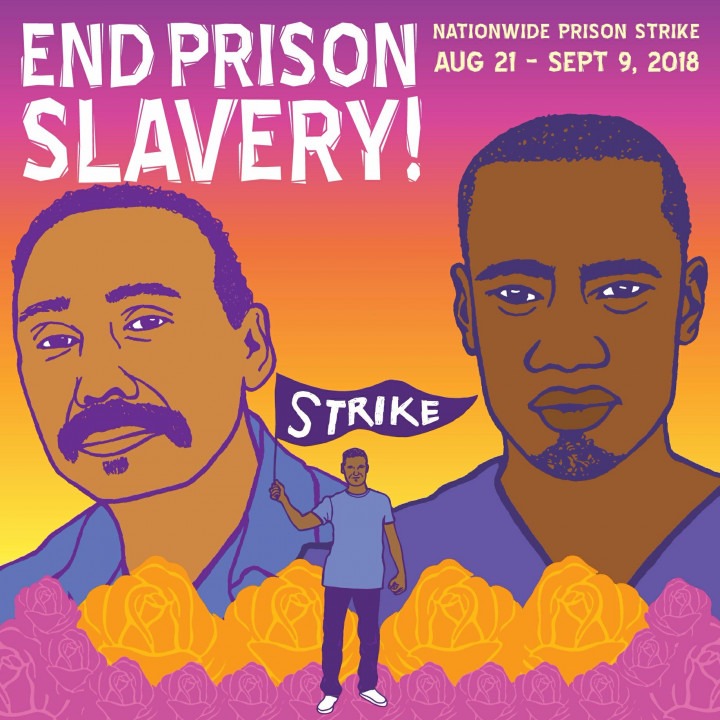
Image courtesy of incarceratedworkers.org
Hebrews 13:3, “Remember those who are in prison, as though you were in prison with them; those who are being tortured, as though you yourselves were being tortured.”
On August 21, incarcerated people across the country began what has become the largest prison strike the U.S. has ever seen. “We are demanding humane living conditions, access to rehabilitation, sentencing reform, and the end of modern-day slavery,” their website says. Their full list of demands call for these ten actions:
- Immediate improvements to the conditions of prisons and prison policies that recognize the humanity of imprisoned men and women.
- An immediate end to prison slavery. All persons imprisoned in any place of detention under United States jurisdiction must be paid the prevailing wage in their state or territory for their labor.
- The Prison Litigation Reform Act must be rescinded, allowing imprisoned humans a proper channel to address grievances and violations of their rights.
- The Truth in Sentencing Act and the Sentencing Reform Act must be rescinded so that imprisoned humans have a possibility of rehabilitation and parole. No human shall be sentenced to Death by Incarceration or serve any sentence without the possibility of parole.
- An immediate end to the racial overcharging, over-sentencing, and parole denials of Black and brown humans. Black humans shall no longer be denied parole because the victim of the crime was white, which is a particular problem in southern states.
- An immediate end to racist gang enhancement laws targeting Black and brown humans.
- No imprisoned human shall be denied access to rehabilitation programs at their place of detention because of their label as a violent offender.
- State prisons must be funded specifically to offer more rehabilitation services.
- Pell grants must be reinstated in all US states and territories.
- The voting rights of all confined citizens serving prison sentences, pretrial detainees, and so-called “ex-felons” must be counted. Representation is demanded. All voices count.
The demands of the strike place a strong emphasis on access to rehabilitation, something that the Church of the Brethren has supported through pushing for restorative justice and an end to mass incarceration. Our commitment to God’s peace is a radical one, one that we should carry to everyone, especially those in prison. The U.S. prison system is one of deep violence and trauma, and rehabilitation is a healing balm we should offer to all who seek it.
The demands also call us to recognize that prison labor is a form of modern-day slavery, paying workers little to nothing and forcing them to work in horrible conditions. We must turn to see the most invisible laborers in our society and the injustices they so consistently endure. As we said in our 2008 Annual Conference resolution on 21st century slavery, “We commit to educating ourselves and others about modern-day slavery and initiating and supporting anti-slavery action at home and abroad. This includes measures to prevent enslavement, to end slavery, to care for those who have been victimized by slavery, and to change our personal lifestyle habits that support it.”
Furthermore, the strike laments the extreme disparity between the treatment of people of color and white people in the current criminal justice system, with many laws on the books that target black and brown people. Mass incarceration and racial injustice are two issues tightly woven together.
At its very core, the strike is calling for the recognition that imprisoned people are humans. “We must see that the denial of basic human rights and the violence and counter-violence that terrorize humanity are all related; we cannot address one without addressing the others. They are connected” (Making the Connection, A.C. Statement 1986).
Getting Involved
The strike ends on September 9 and, with less than a week left, there has been little national news coverage and an increase in punishment for the prisoners who organized the movement. This is a rare moment when prisoners themselves—not simply outsiders speaking on their behalf—are trying to make their voices heard. During the second week of the strike, organizers released a statement saying:
“Right now we know that thousands of prisoners are risking torturous repression to bring this agenda forward, and we do not take their sacrifice lightly and neither should you. Prisoners are facing repression right now as we speak and it is our duty on the outside to do whatever we can to shield them from that violence of the state.”
This is simply a call to action—with only a few days left to the strike, there is still much to be done. A list of ways to take action (as well as many more resources and information on all relevant issues) is on the strike’s website, and the strike’s statement on August 28 lists the states with prisons with known participation. Call your representatives (202-224-3121) to tell them you support the strike and the prisoners’ demands, specifically to be implemented in your state’s prisons. Follow the strike on social media with #August21 and #PrisonStrike and make your support known by amplifying the voices of those involved.
We are called to release the captives, let the oppressed go free, and when our brothers and sisters behind bars desperately ask for peace and rehabilitation, who are we to deny them?
2016 Christian Citizenship Seminar on Mass Incarceration
2010 Annual Conference Resolution on Torture
2008 Annual Conference Resolution on Slavery in the 21st Century
1986 Annual Conference Statement on Making the Connection
National Religious Campaign Against Torture


